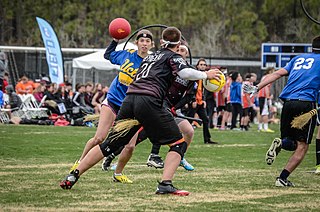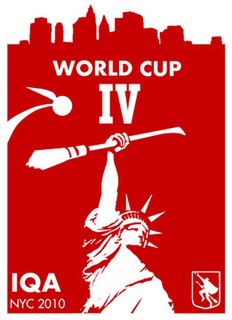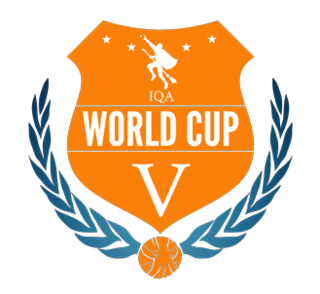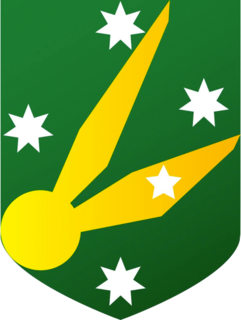
Quidditch is a sport of two teams of seven players each mounted on broomsticks played on a hockey rink-sized pitch. It is based on a fictional game of the same name invented by author J. K. Rowling, which is featured in the Harry Potter series of novels and related media.[3] The game is also sometimes referred to as muggle quidditch to distinguish it from the fictional game, which involves magical elements such as flying broomsticks and enchanted balls. In the Harry Potter universe, a "muggle" is a person without the power to use magic.

The International Quidditch Association (IQA) is the governing body for the sport of quidditch. It was founded as the Intercollegiate Quidditch Association in 2009 following the very first intercollegiate quidditch match. In 2010, the IQA took its current name, and 2016 saw its induction as an international sports federation with its creation of the Congress. It now comprises more than ten national associations governing quidditch in their respective nations.

The IQA World Cup IV was the 2010 edition of the IQA World Cup, a quidditch club tournament then organized by the International Quidditch Association.

The IQA World Cup VI was the 2013 edition of the IQA World Cup, a quidditch club tournament then organized by the International Quidditch Association. The tournament was hosted in Kissimmee, Florida from April 13–14, 2013.

The IQA World Cup V was the 2011 edition of the IQA World Cup, a quidditch club tournament then organized by the International Quidditch Association. It was hosted at Icahn Stadium on Randalls Island in New York City on November 12–13.

The US Quidditch Cup, is a quidditch tournament held in the United States and organized by US Quidditch. Held every year since 2007, it features collegiate and community clubs primarily from the United States. The tournament was formerly known as Quidditch World Cup, but that name now refers to the international championship IQA World Cup.

Oxford Universities Quidditch Club (OUQC) is the quidditch club of both the University of Oxford and Oxford Brookes University. It is composed of two teams: a first team, the Radcliffe Chimeras, and a reserve second team, the Quidlings.. Both teams are official QuidditchUK (QUK) teams. QUK is the UK quidditch governing body, and is a constituent part of the International Quidditch Association (IQA).

Quidditch Canada is the governing body that oversees quidditch within Canada under its mother organization, the International Quidditch Association.

Quidditch Nederland, formerly known as Muggle Quidditch Nederland, is the official governing body of the sport quidditch in the Netherlands, and affiliated with the International Quidditch Association and its European Committee. Quidditch is a sport which combines elements of handball, dodgeball, and rugby, and is derived from the fictional sport of the same name from the Harry Potter series. Its current president is Laurent Lardenois, and the Vice-President is Yuri Vissers. Quidditch Nederland, then Muggle Quidditch Nederland, was founded in 2014 by Jerona van der Gevel and Bram Vries as part of Quidditch Benelux.
Quidditch Benelux is the informal organization of quidditch within the Benelux, consisting of the three member organizations of Belgium Muggle Quidditch, Muggle Quidditch Nederland and the Luxembourgish Quidditch Federation. QBenelux represents these three organizations at the international level in the International Quidditch Association and is a liaison between the three organizations, acting as a bridge and central aide for all international events occurring within the region. Its founding was in 2014 at the creation of BMQ and MQN.

Belgian Quidditch Federation, or BQF, is the governing body of quidditch in Belgium. It was founded in 2012 as a Facebook page to garner interest from potential players and teams within Belgium and began to take shape in 2013 with the introduction of its first two teams: Deurne Dodo's and the Brussels Qwaffles. The organisation began to take shape as a non-profit in early 2014 with the formation of the newly-international International Quidditch Association in the form an international federation. Belgian Quidditch Federation maintains one delegate within the IQA Congress as a member of Quidditch Europe alongside Quidditch Nederland (QNL) and the Luxembourgish Quidditch Federation (FLQ). On 10 October 2014, BQF changed its name from Belgium Muggle Quidditch to its current name to better integrate with other sports in the country.
US Quidditch is a non-profit organization that governs the sport of quidditch in the United States of America. Quidditch is a sport which combines elements of lacrosse, dodgeball, and rugby, and is derived from the fictional sport of the same name from the Harry Potter series. Quidditch was founded in 2005 at Middlebury College in Middlebury, Vermont. The sport is currently played at more than 100 colleges in the United States.

The IQA World Cup is an international quidditch tournament contested by the national teams of the members of the International Quidditch Association, the sport's global governing organisation. The championship, which was named Summer Games and Global Games in its first two editions, has been awarded every two years since 2012. The current champions are the United States, who defeated Belgium in 2018.

Quidditch is a growing team sport in Canada. Due to its relative youth within the sports scene of Canada, adoption is not as widespread as other sports such as rugby or ultimate. However, adoption is picking up with additional university and community teams each year. As a result of its inclusivity and its many niche styles of play, a wider spectrum of individuals are drawn to this sport than other mainstream sports. For the moment, the majority of teams are based in Ontario, Quebec, British Columbia and Alberta, but teams are rapidly starting up in Saskatchewan, Nova Scotia and Manitoba. Quidditch Canada is the governing body for the sport across the country; there are no associations within Quidditch Canada that govern provincially/territorially.
The IQA European Games (EG) are the biennial games for the sport of quidditch held in Europe where national governing bodies send national teams to compete. The European Games were created in response to the IQA World Cup, the biennial tournament wherein nations from across the world compete in a similar style to the FIFA World Cup. Both Games alternate years so in the off years regional tournaments such as the European Games or the Asian Quidditch Cup can occur. These games are the highest level of championships in quidditch aside from Global Games. The 2015 champions were Team France, narrowly beating Team UK.
The quidditch is a sport created in 2005 in Middlebury, Vermont, United States from the Quidditch of the novels of Harry Potter. It did not get to Spain until the year 2012. Nowadays there are near to 16 teams all over the country.

The IQA World Cup VII was the 2014 edition of the IQA World Cup, a quidditch club tournament then organized by the International Quidditch Association. The tournament was held in North Myrtle Beach, South Carolina from April 5–6, 2014.

The Australian national quidditch team is the official quidditch team of Australia. The team is regulated by Australian Quidditch Association and is a national member of the International Quidditch Association. Australia made its debut in 2012 at the IQA Summer Games in Oxford, UK.
The United States national quidditch team is the official quidditch team of the United States. The team is regulated by US Quidditch and is a national member of the International Quidditch Association. The team has won the most IQA World Cup titles, winning the 2012, 2014, and 2018 titles. The USNT only competes in events once every two years; at the IQA World Cup, as it is geographically ineligible for the only other current international Quidditch event; the IQA European Games.

The 2017 IQA European Games were the second European championship for the sport of quidditch. The tournament was held on 7–9 July 2017 in Oslo, Norway and was hosted by the Norges Rumpeldunkforbund and local club OSI Vikings. All European IQA member nations in good standing were allowed to compete. The winners of the tournament were the United Kingdom, who defeated the defending champions France 90*-70 in the final. France subsequently took the silver medal and Norway won the bronze, after defeating Belgium 140*-80. This tournament marked the United Kingdom's first international gold medal at quidditch.















